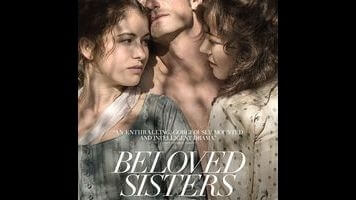A master of novelistic procedurals, Graf is almost completely unknown in the U.S., because most of his work has been produced for German TV. He is a small scale, economical craftsman (16 mm is his preferred format, though Beloved Sisters was shot digitally), and he approaches the Schiller-Charlotte-Caroline triangle not as a ball-gown romance, but as a fast-moving genre piece, chock-full of abrupt zooms and whip-pans. While most films set in the period tend to get hung up on clothes—hence the term “costume drama”—Graf is focused on measures of time, and on evoking the spirit of social and private life in the age of letter-writing, horse-drawn travel, and candlelight. This is a world where everyone is continually waiting for letters, visitors, inheritances, and a future that promises personal and political freedom; as such, it can’t help but be poignant.
The sisters of the title are “Lollo” (Henriette Confurius) and “Lina” (Hannah Herzsprung), daughters of the widow Von Lengefeld (Claudia Messner), raised to speak French so as to keep secrets from the servants, expected to marry into money to replenish the decimated family fortune. The film—which is narrated in the third person and punctuated by blocky time-and-place-setting titles, as though the past were a cold case to be reconstructed incident by incident—opens in 1787. Lina, the free-spirited older sister, has “saved” the family for the time being by marrying a wealthy man, and Lollo has been sent off to the duchy of Saxe-Weimar to do the same. There, she meets young Schiller (Florian Stetter), already a notorious playwright, when he asks for directions, meet-cute style.
Lollo will eventually marry Schiller, but not before she and her older sister enter into a doomed, idealistic three-way with the man of letters, which brings to mind François Truffaut’s Jules And Jim and its superb, under-seen companion piece Two English Girls. Like those films, Beloved Sisters goes out of its way to complicate its central ménage a trois; the film’s lengthy running time and unusually brisk pace allow Graf to pack in a wealth of detail about the political and intellectual climate of the era, the difficulty of sustaining a relationship of mutual ideals in a society that doesn’t share them, and even the technology of printing and distributing books. (This may be the only romance to feature an aside about the social importance of legible serif typeface.)
The result is immersive and intelligent, but not what one would call difficult. Graf’s knack for no-nonsense storytelling means that Beloved Sisters seems to fly past. Each detail and observation—whether it’s about the Romantic mindset, gender roles, or fame in the pre-celebrity age—is integrated so seamlessly that the movie feels effortless. Which, of course, it isn’t; the sort of fleet, sure-footed filmmaking practiced by Graf takes a great deal of serious smarts.


 Keep scrolling for more great stories.
Keep scrolling for more great stories.